How Plumbers locate Leaks in Bath’s Historic Properties
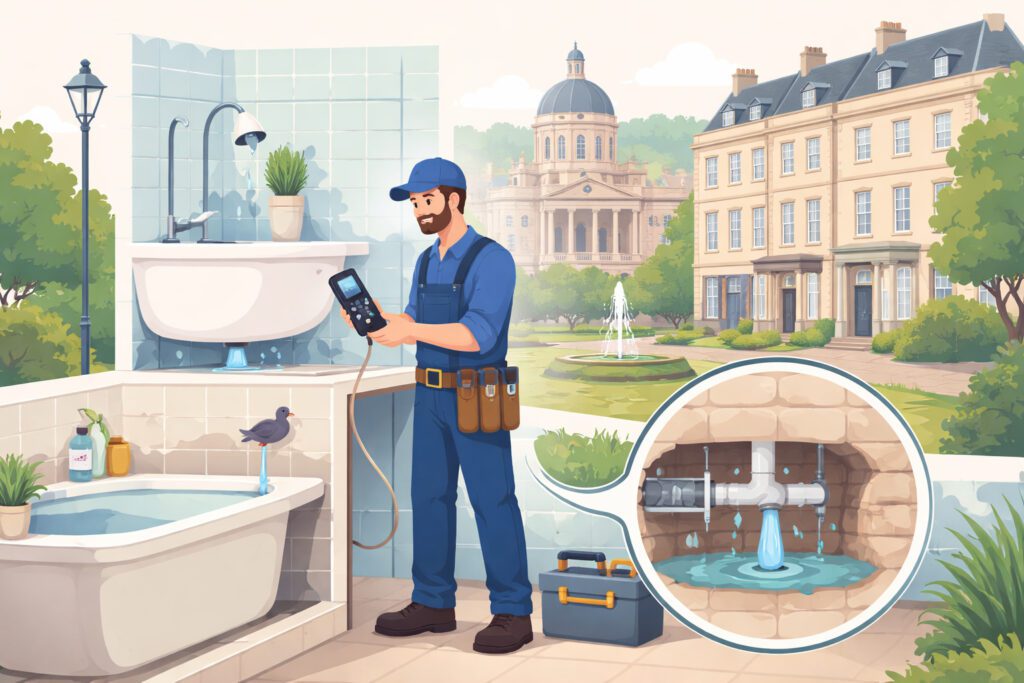
Unexpected water leaks can cause serious disruption and damage in any property. From hidden pipe bursts behind walls to underground leaks below your garden, these issues can quickly become costly if not detected early. Thankfully, professional emergency plumbing services in Bath offer swift and accurate leak detection using advanced technology, saving homeowners from extensive water damage and repair costs. Quick Answer: Leak detection in Bath homes works by using advanced diagnostic tools like acoustic sensors, infrared cameras, and moisture metres to locate hidden water leaks accurately without damaging walls, floors, or underground systems. Understanding the Importance of Leak Detection Many homeowners in Bath only realise there is a leak after noticing signs like damp patches, unusual water bills, or reduced water pressure. Unfortunately, by the time these symptoms appear, significant water damage may already have occurred. This is why early identification through professional leak detection is essential. It not only protects your property’s structure but also prevents mould growth, rot, and expensive repairs down the line. How Professional Leak Detection Works in Bath Homes When you call a plumbing specialist, the process begins with a thorough inspection of your property. Modern leak detection is both non-invasive and highly accurate, relying on technology rather than guesswork. Here is a breakdown of the key methods professionals use to locate leaks efficiently: 1. Acoustic Listening Devices These sensitive sensors detect the sound of escaping water within pipes, even when hidden behind walls or under floors. Trained technicians interpret these signals to locate the precise point of leakage without needing to dismantle your home’s structure. 2. Infrared Thermal Imaging Thermal cameras identify temperature differences caused by moisture or escaping water. This method is particularly effective for leaks under floors, within heating systems, or behind plasterboard where visual inspection is impossible. 3. Tracer Gas Testing For particularly difficult leaks, a safe, non-toxic tracer gas is introduced into the plumbing system. Technicians then use sensitive detectors to track where the gas escapes, pinpointing leaks with outstanding precision. This technique is ideal for external pipes or areas where acoustic detection may be limited. 4. Moisture and Pressure Testing Moisture metres and pressure tests help assess the extent of water presence and monitor the performance of plumbing systems. If pressure drops or moisture readings are abnormal, the team can narrow down which parts of the system need closer inspection. Comprehensive Plumbing Surveys and Preventive Care Professional leak detection often goes hand in hand with a plumbing survey. A survey provides a full overview of the health of your home’s water systems, highlighting potential weak points before they escalate into leaks. This proactive approach is ideal for both homeowners and landlords seeking to maintain efficiency and reduce long-term maintenance costs. When to Call for Emergency Plumbing Services If you notice dramatic drops in water pressure, visible damp patches, or hear hissing sounds around your pipes, it may indicate a serious hidden leak. In such cases, calling experienced emergency plumbers in Bath as soon as possible can prevent worsening damage. Professionals will respond promptly, equipped with advanced leak detection technology to diagnose and stop the leak effectively. Benefits of Professional Leak Detection in Bath Why Choose Local Experts in Bath Local plumbing specialists not only understand Bath’s unique property structures and plumbing layouts, but they can also reach you quickly during emergencies. With their combination of technical skill and local experience, you can trust them to deliver accurate leak detection and efficient repairs that last. Arrange a Local Leak Inspection Today If you suspect a water leak or simply want peace of mind that your property’s plumbing is sound, don’t wait until small issues become major problems. Book a professional inspection today and protect your home from unnecessary water damage. Arrange a local leak inspection today with our expert team to ensure your Bath property remains safe, efficient, and leak-free.
Types of Central Heating Systems Commonly Found in Bath
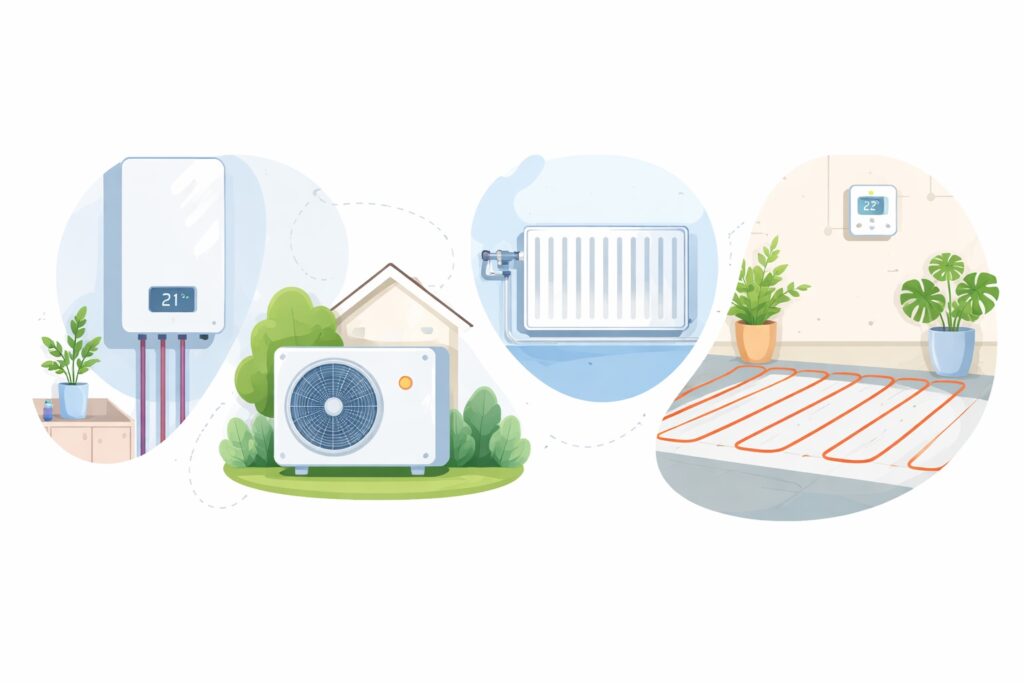
Keeping homes warm and comfortable during Bath’s chilly months relies heavily on an efficient heating system. Many households struggle with energy costs, outdated boilers, or uneven heat distribution throughout their homes. For residents looking to upgrade or maintain their systems, quality central heating services can make a significant difference in both comfort and efficiency. Quick Answer: The main types of central heating systems found in Bath homes include combination boilers (combi systems), system boilers, and conventional boilers. Each option suits different property sizes, usage patterns, and efficiency needs. Combination (Combi) Boiler Systems Combi boilers are among the most popular heating options in Bath due to their space-saving design and energy efficiency. These systems heat water directly from the mains whenever it’s needed, eliminating the need for a separate hot water cylinder. This makes them perfect for smaller homes or apartments where space is at a premium. Combi boilers offer excellent energy efficiency, reducing running costs and helping homeowners lower their carbon footprint. They’re also ideal for households that don’t require simultaneous use of multiple hot water outlets. If you’re considering a new combi system, it’s often worth exploring professional boiler replacement options to ensure correct installation and long-term reliability. System Boiler Heating Systems System boilers are another common type of central heating system for Bath homes, especially properties with multiple bathrooms. Unlike combi boilers, system boilers require a hot water cylinder to store heated water, allowing for the consistent use of hot water across different outlets at once. This feature makes them suitable for larger households where several people might need hot water simultaneously. One of the benefits of system boilers is that many of the key components needed for heating, like the pump and expansion vessel, are built into the boiler unit itself. This makes installation quicker and tidier. These boilers pair well with modern radiators and underfloor heating, offering a balanced and efficient whole-home heat distribution. Conventional (Regular or Heat-Only) Boiler Systems Traditional Bath properties, particularly those with older plumbing systems, often still use conventional or heat-only boilers. These systems consist of both a hot water cylinder and a cold-water storage tank, usually located in the loft. They’re well-suited to large homes with multiple bathrooms and older radiators designed for vented heating systems. While conventional boilers provide excellent water pressure for multiple taps, they do require more space. However, if your existing system is already set up for a regular boiler, it can sometimes be more cost-effective to maintain or upgrade it rather than switching to a different type of central heating system. Energy Efficiency and Modern Upgrades When it comes to choosing between the different types of central heating systems for Bath homes, energy efficiency should be a top consideration. Modern condensing boilers, regardless of type, are designed to recover more heat from exhaust gases, making them far more efficient than older models. Upgrading to a modern boiler not only reduces energy bills but also improves safety and environmental performance. Regular maintenance is equally important. Scheduling routine boiler servicing helps prevent breakdowns, ensures compliance with manufacturer warranties, and keeps your system running at peak efficiency all year round. Many homeowners in Bath find that investing in preventive servicing saves significant costs in the long run. Choosing the Right Heating Solution for Your Home The best central heating system depends on your property type, household size, and water usage patterns. A heating specialist can assess your current setup and help you decide whether a combi, system, or conventional boiler system will deliver the best comfort and efficiency for your home. Choosing the right partner for central heating services ensures that your installation and maintenance are handled professionally and safely. If your current boiler is outdated or inefficient, arranging a consultation for a potential boiler replacement could be the first step toward improved warmth, better energy performance, and reduced utility costs. Final Thoughts Understanding the types of central heating systems commonly found in Bath can help homeowners make informed decisions about the best way to heat their property efficiently and sustainably. Whether you’re renovating a Georgian terrace or upgrading a modern apartment, selecting the right boiler system makes a noticeable difference in comfort and energy use. For expert guidance on installation, maintenance, or system upgrades, Talk to our heating specialists in Bath today and discover how the right heating solution can transform your home.
Gas Boilers Explained
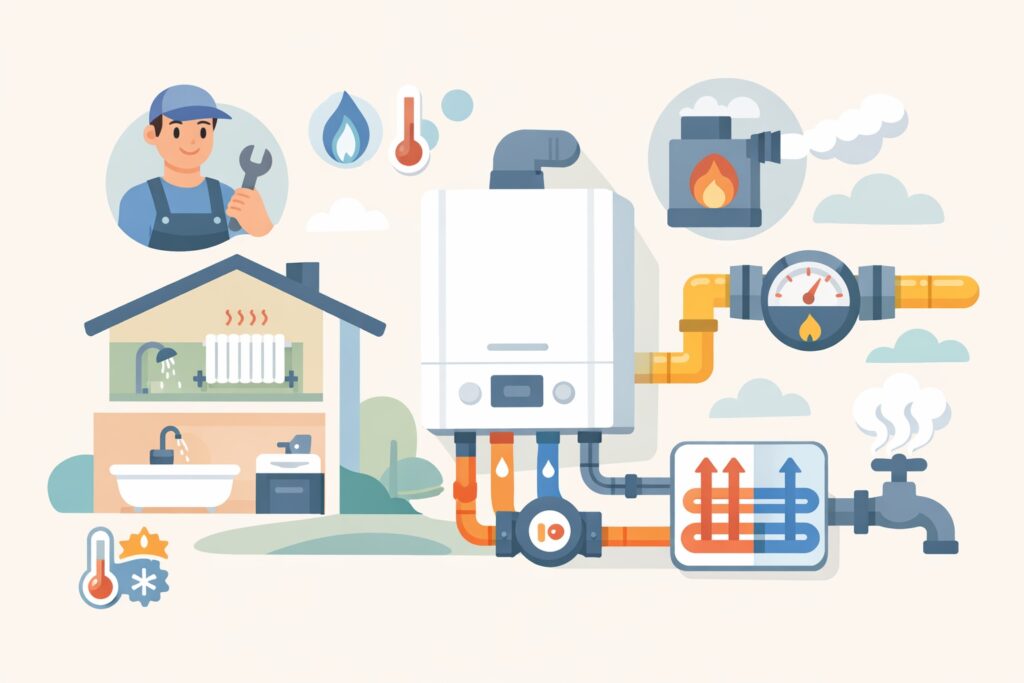
When it comes to reliable home heating, many Bath homeowners turn to gas boilers to keep their spaces warm and energy efficient. The gas boiler experts at Greensmart Services have seen it all, from ageing systems struggling to perform efficiently to cutting-edge condensing boilers that deliver comfort and lower energy bills. Homeowners often face challenges such as inconsistent heating, high fuel costs and the need for timely maintenance, issues that can all be addressed with the right boiler system and expert care. Quick Answer: Gas boilers in Bath homes work by burning natural gas to heat water, which is then circulated through radiators or underfloor systems to provide warmth and domestic hot water efficiently. Understanding How Gas Boilers Operate To understand how gas boilers work in typical Bath homes, it helps to break down the process into simple steps. A gas boiler uses a burner to ignite natural gas or LPG, creating heat in a combustion chamber. This heat passes through a heat exchanger, which transfers it to water circulating within the system. The heated water is then distributed throughout radiators or a hot water cylinder, depending on the type of boiler installed. Modern condensing boilers capture heat from exhaust gases that older systems would waste, making them far more energy efficient. This recovered heat warms the returning water, ensuring less fuel is needed to reach the desired temperature. Types of Gas Boilers Found in Bath Homes Every home in Bath is different, and selecting the right boiler depends on the property layout, heating demand and household size. The three main types of gas boilers are: Choosing between these options is easier with expert guidance. Greensmart Services offers professional boiler replacement services that ensure homeowners select the most efficient system for their living space and lifestyle. Energy Efficiency and Performance Efficiency is a key reason many Bath homeowners upgrade their boilers. Modern gas boilers achieve up to 90% efficiency, converting most of the fuel into useful heat with minimal waste. This not only reduces energy bills but also lowers carbon emissions, helping property owners support Bath’s ongoing commitment to environmental sustainability. Regular servicing plays a crucial role in sustaining performance. Through professional boiler servicing, experts can identify potential issues before they escalate, clean internal components and ensure the boiler operates safely and efficiently year-round. Maintaining and Repairing Boiler Systems Even a well-maintained system may eventually require repairs. Common issues include pressure drops, ignition failures and thermostat faults. A prompt call to qualified technicians for boiler repairs ensures safe, reliable heating is restored quickly, minimising disruption and preventing further damage. Routine inspections, especially before winter, prevent costly breakdowns and ensure consistent comfort during Bath’s colder months. Pairing regular maintenance with timely upgrades ensures boilers operate at peak performance for many years. Benefits of Understanding Your Boiler Understanding how gas boilers work in typical Bath homes empowers homeowners to make informed decisions about maintenance, upgrades and efficiency. When you know the signs of inefficiency, such as unusual noises or slower heating, you can act early to extend the life of your boiler and improve home comfort. Choosing the Right Experts in Bath Working with experienced professionals ensures safety, compliance and energy savings. The gas-safe certified team at Greensmart Services has years of hands-on experience repairing, servicing and installing boilers throughout Bath. Their local knowledge and customer-focused service help homeowners keep heating systems performing efficiently even in older properties where pipework and infrastructure need special consideration. Conclusion Whether upgrading an old system or maintaining a modern one, understanding how gas boilers work in typical Bath homes is the first step toward efficient, dependable heating. With the help of skilled local engineers, you can enjoy year-round comfort and lower running costs. If you’d like expert guidance for your own property, get tailored boiler advice for your Bath home today.
Central Heating Systems Explained
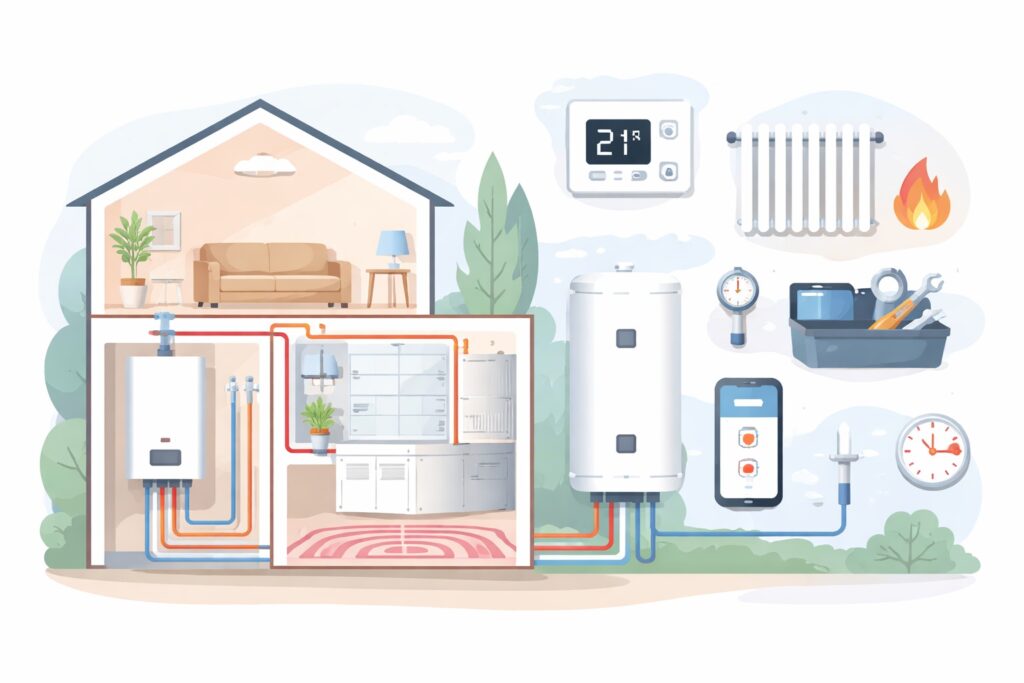
When it comes to staying comfortable through chilly Somerset winters, reliable central heating services are essential for homeowners. Many properties across Bath have older heating systems that may be inefficient or prone to failure, which can lead to cold rooms, higher bills and unnecessary stress. Understanding how central heating systems work not only helps you identify when something’s wrong but also ensures your home remains energy-efficient and warm year-round. Quick Answer: Central heating systems in Bath homes work by using a boiler to heat water, which is then circulated through radiators and pipes to distribute warmth evenly throughout the property. The Core Components of a Central Heating System Every efficient heating setup in Bath properties consists of key components working in harmony. These include the boiler, radiators, piping and controls. The process begins when your boiler heats water, which is then pushed through pipes to radiators installed throughout the home. Once the water cools, it returns to the boiler to be reheated, maintaining a consistent temperature. How Boilers Power the System The boiler acts as the heart of your central heating system. It can run on natural gas, LPG or even renewable energy sources depending on your setup. The heated water either moves directly into the radiators or through underfloor heating systems. Regular boiler servicing ensures this process remains efficient, prolongs the life of the unit and prevents common issues such as leaks or blockages. Heat Distribution Across Bath Homes Once the water is heated, it’s distributed through a network of pipes to radiators strategically positioned throughout the property. The radiators emit heat via convection, warming the air around them. Thermostatic radiator valves and smart thermostats help regulate the temperature in each room, ensuring efficiency and reducing energy wastage. Different Types of Central Heating Systems Understanding how central heating systems work in Bath homes also means recognising that not all systems are the same. Some of the most common include: Why Energy Efficiency Matters in Bath Properties Bath’s mix of heritage and modern homes means many residents need tailored heating solutions. Upgrading an old boiler to a modern replacement can significantly reduce energy usage and bills. The team at GreenSmart Services offers expert boiler replacement solutions that align with the latest efficiency standards, helping you meet environmental targets while staying comfortable. Common Issues Homeowners Encounter Even with high-quality equipment, systems can develop faults over time. Common problems include uneven heating, strange noises or a boiler losing pressure. Regular maintenance and prompt servicing can prevent most of these issues. With reliable plumbing and heating services in Bath, small problems can be addressed before they lead to costly repairs. Maximising System Efficiency and Comfort To keep your heating system running smoothly, it’s important to bleed radiators regularly, check boiler pressure and ensure yearly servicing is done. Smart thermostats and weather compensation controls can also help by automatically adjusting heating levels based on external conditions. This technology not only improves comfort but optimises energy use across your home. Choosing the Right Heating Professional in Bath Ensuring your central heating system is installed and maintained by qualified specialists is key to its performance. Professionals understand the local housing types in Bath, from Georgian terraces to new builds, and can recommend the most suitable systems for your property’s structure and needs. They can also provide tailored maintenance schedules that keep your heating reliable throughout the year. Speak to a Bath Heating Specialist Today If you’re ready to optimise comfort and efficiency in your property, it’s time to speak to a trusted local expert. For professional advice, maintenance or upgrades, speak to a Bath heating specialist today and find out how your central heating system can work better for your home.
Common Gas Boiler Faults Seen in Bath Homes
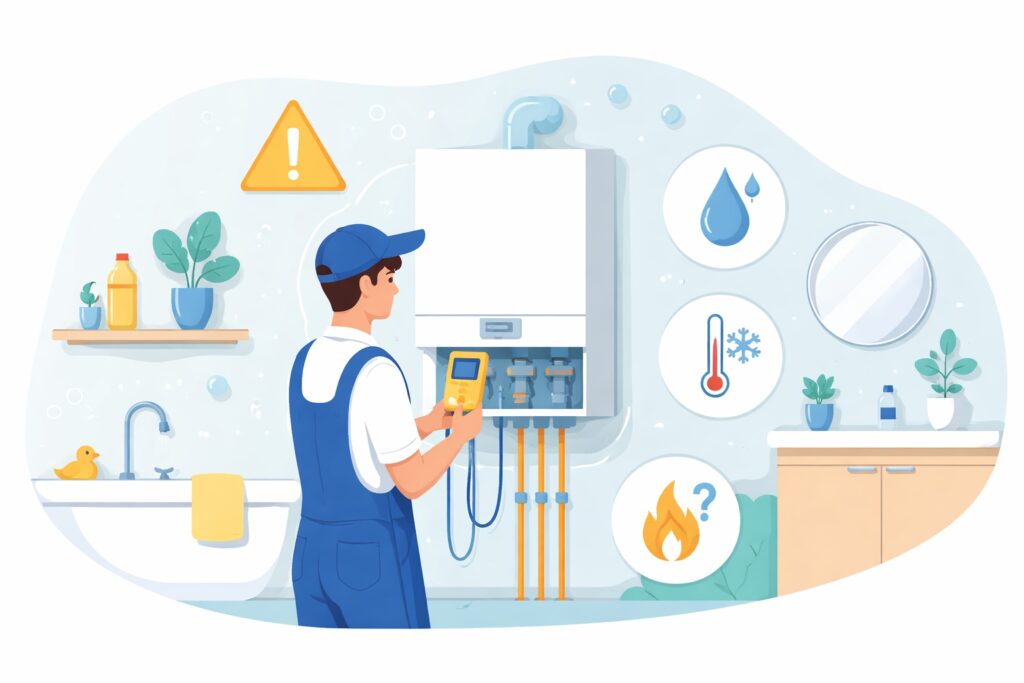
For many residents, reliable Bath gas boiler repairs are essential to keep their homes warm and comfortable. When your boiler falters, it often happens at the worst possible moment, a chilly morning or right before hosting guests. Understanding the most common gas boiler faults seen in Bath homes and their fixes can save time, reduce stress, and prevent costly breakdowns. Quick Answer: The most common gas boiler faults in Bath homes include low pressure, thermostat errors, no heat or hot water, strange noises, and pilot light problems. Regular servicing and prompt repairs can help prevent these issues and keep your heating system efficient year-round. 1. Low Boiler Pressure Low pressure is one of the most frequent problems Bath homeowners experience. It can lead to uneven heating or even cause the boiler to shut down entirely. The pressure gauge on your boiler should sit around 1 to 1.5 bar when cold. If it’s lower, you may have a leak or a faulty pressure relief valve. Simply repressurising the system might solve the problem, but if it continues to drop, it’s wise to contact a local expert for boiler repairs to diagnose and address the root cause quickly. 2. Thermostat or Control Issues When the thermostat doesn’t communicate correctly with your boiler, your heating might not turn on when needed or might cut off unexpectedly. Sometimes, this can be due to dead batteries or outdated control units. Replacing the batteries or recalibrating the thermostat can resolve minor glitches, but persistent issues may need a technician’s attention. Scheduling routine boiler servicing ensures that your controls and sensors stay calibrated for reliable comfort. 3. No Heating or Hot Water One of the most frustrating gas boiler faults is when there’s no heating or hot water. This could result from broken diaphragms, airlocks, or issues with motorised valves. Bath homes often have older installations where sediment buildup or limescale can also interfere with system performance. A professional engineer can perform diagnostics to identify the fault and carry out an effective repair to restore consistent heating and hot water. 4. Strange Noises from the Boiler Boilers should run quietly, so clunks, bangs, or whistling are warning signs. Common causes include trapped air, a failing pump, or kettling due to limescale. These noises typically signal that something within the system is under strain. An engineer can flush out the system or replace worn components during regular servicing to maintain efficiency. 5. Pilot Light Keeps Going Out For older boilers with a pilot light, frequent extinguishing could indicate a draught, thermocouple fault, or deposit buildup. While relighting the pilot might temporarily solve the issue, the underlying cause must be addressed for safety. Where gas flow or ignition issues exist, it’s critical to rely on experienced emergency plumbing services for immediate help rather than attempting a risky DIY fix. 6. Radiators Not Heating Evenly If you notice one radiator blazing while another stays cold, trapped air or sludge buildup could be the culprit. Bleeding your radiators can often solve trapped air issues, but persistent cold spots may mean it’s time for a power flush or further inspection. Keeping up with boiler servicing helps keep your system free from blockages that affect heating efficiency. 7. Leaks Around the Boiler Any visible leak from your boiler or pipework should never be ignored. Leaks can originate from corroded pipes, poor seals, or internal component wear. Even minor drips can lead to serious damage over time and lower system pressure. Professional boiler repair engineers from Bath can identify the leak’s source quickly and carry out a safe, lasting fix. 8. Frozen Condensate Pipes With Bath’s cold winters, frozen condensate pipes are a recurring seasonal issue. The pipe that carries waste water from your boiler can freeze outdoors, blocking the system and shutting the boiler down. Pouring warm (not boiling) water over the pipe can help thaw it safely, but insulation and regular maintenance can prevent freezing in the first place. Preventative Maintenance is Key To avoid costly callouts and extend your boiler’s lifespan, regular maintenance is crucial. Assuming your boiler runs perfectly year after year can lead to inefficiency, higher energy bills, or even dangerous faults. Arranging annual checks through professional boiler servicing ensures issues are caught before they escalate. In emergencies such as sudden leaks or complete heating failure, quick action through reliable emergency plumbing services in Bath can make all the difference in restoring warmth and safety to your home. Final Thoughts Understanding the most common gas boiler faults in Bath homes and fixes helps you act quickly and prevent more serious breakdowns. Low pressure, thermostat failures, and leaks are all common, but with consistent expert care and servicing, your boiler can perform efficiently year-round. Arrange a local boiler check today to keep your heating system working reliably and efficiently. Contact your local experts and ensure your Bath home stays warm and safe all season long.
How Often Should Gas Boilers Be Serviced in Bath Homes?
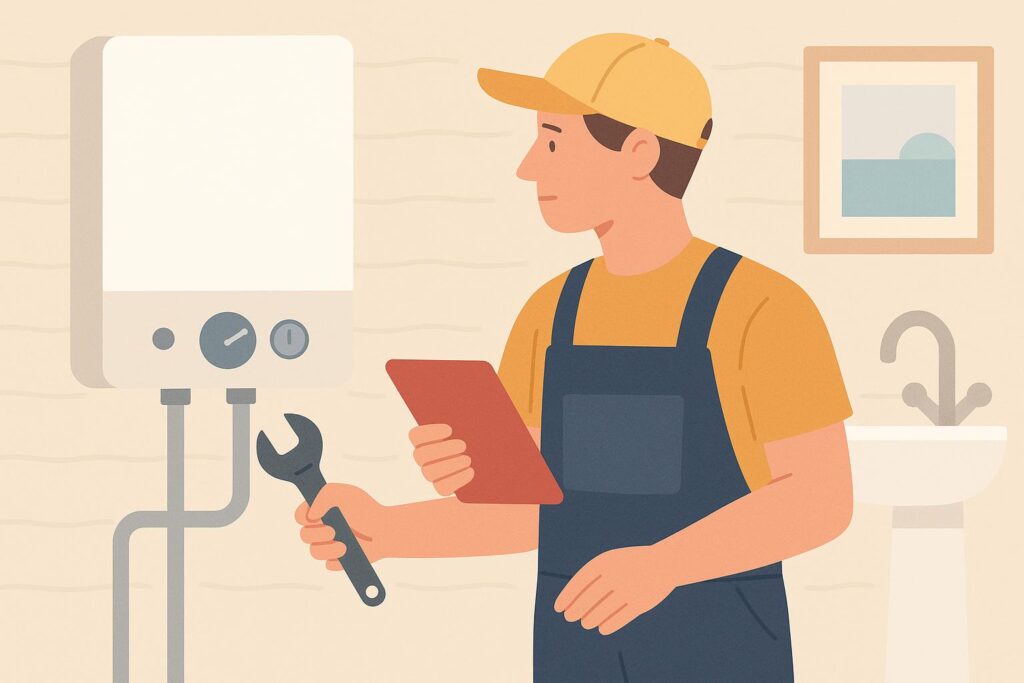
For homeowners seeking reliable professional boiler servicing in Bath, understanding how often to schedule maintenance is key to keeping heating systems running safely and efficiently. Many Bath households only realise the importance of regular servicing when they face problems such as low heating efficiency, strange boiler noises or even system breakdowns during cold winter spells. Regular servicing prevents these frustrations, saving both money and stress in the long run. Quick Answer: Gas boilers in Bath homes should be serviced once every 12 months by a Gas Safe registered engineer to maintain efficiency, ensure safety and comply with manufacturer warranties. Why Annual Servicing Matters A gas boiler is the heart of the home’s heating system, quietly working year-round to keep water hot and the house warm. Over time, however, dust, debris and component wear can affect how well it performs. Without periodic maintenance, homeowners risk higher energy bills, unexpected repairs or even safety concerns like gas leaks and carbon monoxide issues. That’s why maintaining a consistent gas boiler servicing frequency in Bath is not only a recommendation but a necessity for peace of mind. Recommended Gas Boiler Servicing Frequency in Bath The typical recommendation is one service every 12 months. However, there are circumstances where more frequent checks may be advisable, such as for older boilers or homes with high heating demands. Regular yearly servicing ensures components are cleaned, settings optimised and any early signs of faults are addressed before they become costly issues. Following this annual schedule aligns with manufacturer guidance and helps keep any active warranty valid. What Happens During a Professional Boiler Service? When a qualified engineer performs a service, they inspect and test key parts of the system to ensure safe and efficient operation. During a comprehensive service, you can typically expect the following: At Green Smart Services, we handle every service with precision and care, ensuring Bath homeowners benefit from maximum energy efficiency and comfort throughout the year. Benefits of Regular Gas Boiler Servicing Keeping your gas boiler serviced annually brings several important benefits: Affordable Maintenance Through Care Plans For households that prefer consistent servicing without the worry of unexpected costs, maintenance packages such as the Green Smart boiler care plans offer an affordable and convenient solution. These plans make it easy to stay on top of the recommended gas boiler servicing frequency in Bath, ensuring your system gets the professional attention it needs every year. When to Schedule Your Next Service? The best time to book a service is in late summer or early autumn, just before the heating season begins. This timing ensures your boiler is in top condition and ready for the colder months. If your last service was more than a year ago, or if you’ve noticed reduced heating performance, now is the perfect time to take action. Conclusion Keeping up with the proper gas boiler servicing frequency in Bath is one of the easiest and most effective ways to maintain home comfort and safety. Whether you need an annual inspection or wish to join a flexible care plan, the key is to schedule servicing regularly and with trusted professionals. Don’t wait until problems arise, protect your home’s warmth and efficiency today. Ready to ensure your boiler runs smoothly all year round? Book a boiler service with Green Smart Services and enjoy reliable, professional support for your Bath home.
How Worcester Combi Boilers Perform in Bath Homes
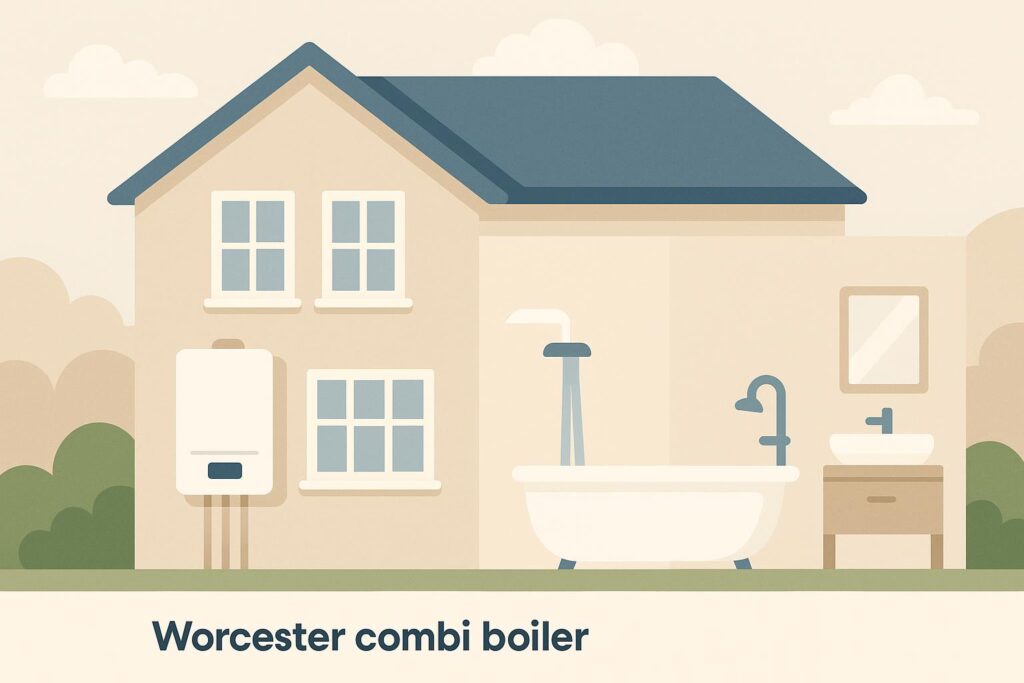
When it comes to reliable heating and hot water, residents across Bath often rely on Worcester combi boilers for their trusted performance. However, to keep these systems working efficiently, regular Worcester boiler servicing and repairs are crucial. Homeowners frequently face issues such as fluctuating water temperatures, low pressure, or unexpected breakdowns during colder months, making it essential to maintain consistent care for their boiler units. Quick Answer: Worcester combi boilers perform exceptionally well in Bath homes when regularly serviced and maintained, offering consistent heating efficiency, reliability, and long-term energy savings. Why Worcester Combi Boilers Are Popular in Bath Homes Worcester combi boilers are known for their space-saving design and reliable performance. With Bath’s mix of period properties and modern apartments, these boilers fit seamlessly into homes that demand both efficiency and compact installations. The all-in-one heating and hot water system eliminates the need for separate tanks, making them a preferred choice for homeowners seeking practicality and performance. These boilers are particularly suited to Bath homes where both space and energy efficiency are priorities. The sleek design ensures they can be fitted discreetly into kitchen cupboards or utility areas without compromising output or comfort. Understanding Worcester Combi Boiler Performance in Bath The overall Worcester combi boiler performance in Bath depends on three main factors: the quality of installation, regular servicing, and prompt attention to minor faults. When well maintained, a Worcester combi boiler delivers superior water pressure and consistent heating even in older properties with varying plumbing systems. Importance of Regular Servicing for Worcester Boilers Regular maintenance is vital to maintaining both performance and safety. Annual checks safeguard against efficiency losses caused by internal buildup, faulty components, or unnoticed leaks. Scheduling consistent Worcester boiler servicing helps prevent expensive repairs and ensures your system remains energy-efficient all year round. Technicians verify gas pressure, test combustion levels, and clean internal parts to guarantee the boiler operates safely. Beyond extending the boiler’s lifespan, professional servicing reduces the likelihood of inconvenient breakdowns during Bath’s colder months. When You Need Repairs or Replacement Even the most reliable systems can encounter wear and tear. Signs such as strange noises, reduced hot water flow, or uneven heating indicate that your boiler may require expert attention. A timely call for boiler repairs can restore performance quickly and prevent the problem from worsening. In cases of older units with frequent breakdowns, replacement might be the most cost-effective option. Worcester’s newer combi boilers are designed with improved energy ratings, making them environmentally friendly and suitable for Bath’s broad range of house styles. Maximising Energy Efficiency in Bath Homes Worcester combi boilers are built to deliver outstanding energy performance, yet their potential can only be achieved through correct use and regular professional care. Ensuring radiators are balanced, keeping an eye on pressure levels, and using thermostat controls effectively all help maintain optimum efficiency. Bath homeowners can also take advantage of regular servicing schedules to keep energy bills manageable without compromising comfort. Keeping Your Boiler Performing at Its Best For Bath homeowners, the combination of a high-quality Worcester combi boiler and scheduled servicing ensures dependable heating throughout the year. Regular inspections highlight small issues before they escalate, preserving both performance and safety. Expert engineers are always available to assess, service, and repair Worcester boilers across Bath, ensuring homes remain warm and energy-efficient. Final Thoughts and Call to Action When maintained properly, Worcester combi boilers deliver consistent warmth and hot water for Bath homes, offering superior energy efficiency and reliability. To ensure your system continues to operate at its best, don’t delay regular servicing or timely repairs. Check your boiler performance today and schedule professional support to maintain top Worcester combi boiler performance in Bath.
What Affects the Cost of a Boiler Quote in Bath?

When it comes to arranging boiler replacement services in Bath, homeowners often wonder what factors determine the final cost of a quote. Common pain points include unexpected expenses, uncertainty about installation needs, and the challenge of finding a reliable, transparent provider. Understanding these variables helps you make informed decisions and ensures that your investment provides long-term efficiency and comfort for your home. Quick Answer: The cost of a boiler quote in Bath depends on factors such as the type of boiler, installation complexity, property size, efficiency requirements, and whether additional work like pipework or controls is needed. 1. Type of Boiler You Choose The biggest influence on price is the type of boiler. Combi boilers are compact and cost-effective, while system or regular boilers serve homes with higher hot water demands. Premium models with advanced technology and better warranties tend to cost more upfront but can save money through higher efficiency levels in the long run. 2. Installation Complexity Every home in Bath has its own unique setup, and that directly affects your boiler quote cost. If your new boiler is being installed in the same position as the old one, labour time and materials will be minimal. However, moving the boiler to a new location or altering your existing pipework can significantly increase costs. 3. Boiler Size and Output The size and heat output of your new boiler affect both the initial price and running costs. Larger homes or properties with multiple bathrooms require more powerful boilers to maintain efficiency. A professional engineer will assess your property’s specifications to recommend the correct size to ensure comfort without overspending. 4. Energy Efficiency and Technology Modern boilers are designed for efficiency, which often comes with smart controls and energy-saving features. These smart systems allow better temperature management and can integrate with renewable energy solutions. While these systems may raise the initial quote, they help reduce energy bills over time. Green Smart Services offers high-efficiency options within their boiler replacement services that fit varied budgets. 5. Additional Work or Upgrades Beyond simply replacing a boiler, your system may require upgrades like new thermostats, rewiring, or flue replacements. These necessary additions influence the total boiler quote cost in Bath. Investing in quality components ensures long-term reliability and compliance with safety standards. 6. Access and Location Your property’s accessibility can also affect labour costs. Ground-floor installations tend to be straightforward, whereas installing a boiler in a loft or tight space requires additional time and equipment. Discussing these details during your survey helps to avoid any unexpected adjustments later. 7. Brand and Warranty Options Choosing a reputable boiler brand can increase initial costs, but often includes longer warranty coverage and better efficiency. Brands offering extended warranties reduce future repair expenses and add peace of mind. It’s worth considering that quality installation paired with a trusted manufacturer can reduce lifecycle costs. 8. Finance and Payment Flexibility Upgrading a boiler can be a major expense, but flexible finance options make it more manageable. Through finance plans available from Green Smart Services, Bath homeowners can spread the cost into affordable monthly payments. This means you can benefit from energy savings immediately without worrying about paying the full amount upfront. 9. Why Choose a Local Specialist in Bath? A local expert understands the heating needs specific to Bath’s homes and weather conditions. Working with a nearby specialist ensures faster response times and transparent pricing. Green Smart Services has extensive experience providing tailored quotes and professional installations that reflect both quality and value. Getting an Accurate Boiler Quote To obtain the most accurate quote, it’s best to arrange an on-site assessment. The engineer will consider your home layout, system condition, and heating requirements, helping you choose the ideal boiler type. This thorough approach ensures your quote reflects every factor that could influence the final cost. Final Thoughts Understanding the factors behind your boiler quote cost in Bath allows you to make confident decisions about your home’s heating system. From the type and size of boiler to additional installation needs and finance options, every detail contributes to your final investment. Choosing a trusted local company ensures you get fair pricing, efficient installation, and lasting performance. Ready to take the next step? Get your boiler quote today and discover a tailored solution designed for your home’s comfort and efficiency.
What Is a System Boiler and Why does It Suit Some Bath Homes?
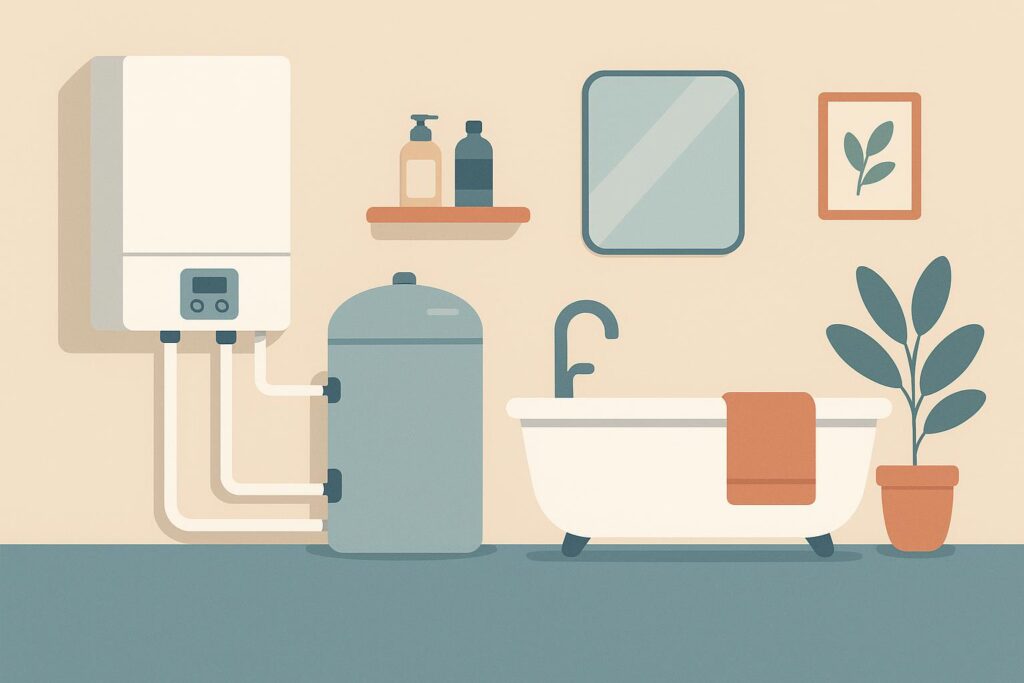
When choosing a new heating system for your home, finding the right boiler type can feel daunting. Whether you’re grappling with low water pressure, inconsistent temperature, or an outdated heating setup, the right solution can make all the difference. Many homeowners in Bath are turning to trusted system boiler installation specialists to enjoy reliable heating and hot water without the stress of those common issues. Quick Answer: A system boiler is a high-efficiency heating system that stores hot water in a cylinder, offering consistent water flow to multiple taps at once. It’s ideal for Bath homes with greater hot water demands or limited loft space. Understanding What a System Boiler Is A system boiler, unlike a combi boiler, uses a separate hot water cylinder to store heated water. This means your household has a ready supply of hot water whenever you need it. The boiler itself contains most of the key components required for heating and hot water, which makes installation quicker and maintenance simpler. Why a System Boiler Works Well for Bath Homes Bath is known for its mix of historic properties and modern developments, which often come with unique heating needs. Older homes can have larger spaces and several bathrooms, while newer properties tend to be more energy-efficient but lack attic storage for cold water tanks. A system boiler for Bath homes fits beautifully into both scenarios. It delivers strong water pressure, even when multiple taps and showers are running. At the same time, it doesn’t require a large tank in the loft, so it’s an excellent choice for smaller properties or homes without attic space. Main Benefits of a System Boiler Common Situations Where Bath Homeowners Choose System Boilers Many families in Bath opt for a system boiler when they’re upgrading an older setup that struggles to meet their daily water demands. Large family households, student rentals, and renovated townhouses commonly install system boilers to provide uninterrupted hot water. The system’s ability to handle multiple simultaneous uses makes it perfect for homes with more than one shower or bath. Installation and Maintenance Considerations When you choose experienced local professionals for installation, the process is straightforward. Reliable technicians from GreenSmart Services handle everything from removing your old system to fitting your new boiler. Because many system boilers have built-in components such as pumps and expansion vessels, setup time and disruption are reduced. Once fitted, regular servicing helps maintain efficiency and longevity, giving you peace of mind all year round. Why Choose GreenSmart Services for Your System Boiler Installation At GreenSmart Services, our certified heating specialists understand the needs of Bath properties, whether large or small. We recommend and install system boilers that deliver efficiency, reliability, and comfort suited to your lifestyle. From consultation to installation and ongoing support, our focus is on helping you achieve optimal home heating with minimal stress. Final Thoughts For homeowners looking to improve both comfort and efficiency, a system boiler for Bath homes can be a game-changing upgrade. With steady hot water, strong pressure, and space-saving advantages, it’s a practical option for all kinds of local properties. Expert installation ensures it performs flawlessly and remains energy-efficient for years. Ready to discover how a system boiler could enhance your Bath home? Talk to a boiler expert today and book your installation consultation with GreenSmart Services.
What’s Involved in Central Heating Installation in Bath?
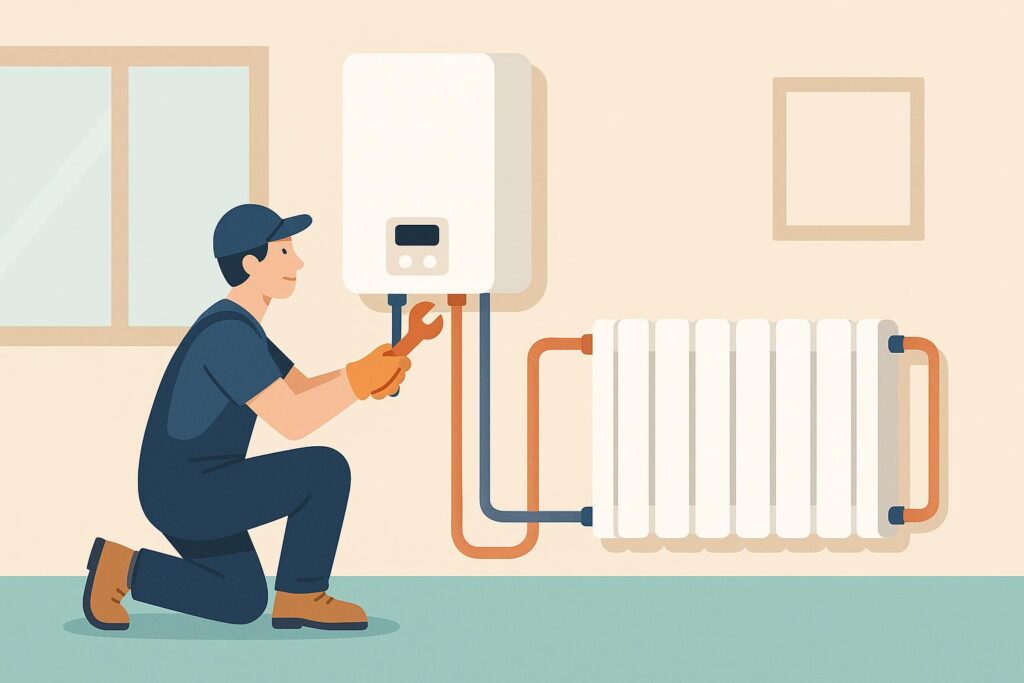
When it comes to central heating installation in Bath, homeowners often face a mix of excitement and uncertainty. The thought of having a warm, comfortable home through the colder months is appealing, but the process of choosing the right system, coordinating installation, and understanding the costs can feel overwhelming. A well-planned installation, however, ensures better energy efficiency, consistent heating, and long-term savings. Quick Answer: Central heating installation in Bath involves assessing your property’s needs, selecting an efficient heating system, professional fitting by qualified engineers, and final testing to ensure safe and reliable operation. Initial Assessment and Heating Survey Every successful heating installation begins with a thorough assessment of your property. Professional engineers will evaluate the size, layout, insulation, and existing systems within your home. This inspection helps determine the most efficient system type and boiler output for your household, ensuring proper heat distribution and reduced energy bills. At this stage, you can book a heating survey to get tailored advice on what system will best suit your property. This survey allows experts to discuss your heating needs, any preferred energy source options, and budget considerations before work begins. Choosing the Right Central Heating System The next essential step is selecting the right type of central heating system. Modern homes in Bath often benefit from energy-efficient boilers paired with radiators or even an underfloor heating system. Underfloor systems are becoming increasingly popular for those seeking efficient and discreet heating. They distribute warmth evenly throughout a room and work particularly well with modern boilers. To explore options for underfloor heating, it’s worth considering how this system could complement your central heating setup. Professional Installation Process Once the ideal system is chosen, the installation process begins. Qualified heating engineers will remove any old equipment if required and prepare your home for the new setup. Pipework may need to be rerouted, new radiators installed, and thermostats fitted. Experienced professionals ensure that every step complies with safety regulations and that the system is configured to operate efficiently. Proper installation also involves flushing and testing the new system to eliminate air pockets and debris that could affect performance. Technicians from trusted providers like Green Smart Heating Services in Bath handle this process carefully to guarantee reliable long-term results. Testing and Final Adjustments The final phase involves testing the newly installed central heating system. Engineers will check for leaks, measure pressure levels, and verify that every room heats evenly. Once satisfied with performance and safety, the system is handed over to you with guidance on operation and maintenance. Setting up thermostats and timers correctly helps ensure you’re getting the most efficient comfort levels while keeping running costs down. This step is vital for energy-conscious homeowners wanting a consistent and controllable heat supply throughout the year. Ongoing Care and Maintenance After installation, periodic maintenance is key to extending the lifespan of your heating system. Annual servicing, filter cleaning, and safety checks are recommended to prevent breakdowns and maintain energy performance. Reliable service providers not only offer installation but also support with future maintenance, ensuring your system continues to run optimally. Why Choose Green Smart Heating Services? With experience in plumbing and heating services, Green Smart provides expert guidance and fully accredited engineers to manage your installation from start to finish. Whether you are upgrading an outdated system or fitting one in a new property, choosing skilled professionals guarantees reliability, safety, and energy efficiency. Book Your Central Heating Installation in Bath Today If you’re considering central heating installation Bath homeowners can rely on, don’t wait until the cold sets in. Having an efficient heating system installed now ensures comfort and savings all year round. Book a heating survey today to get started with a tailored plan designed for your home and lifestyle.
Worcester Bosch Combi Boilers Explained for Bath Properties
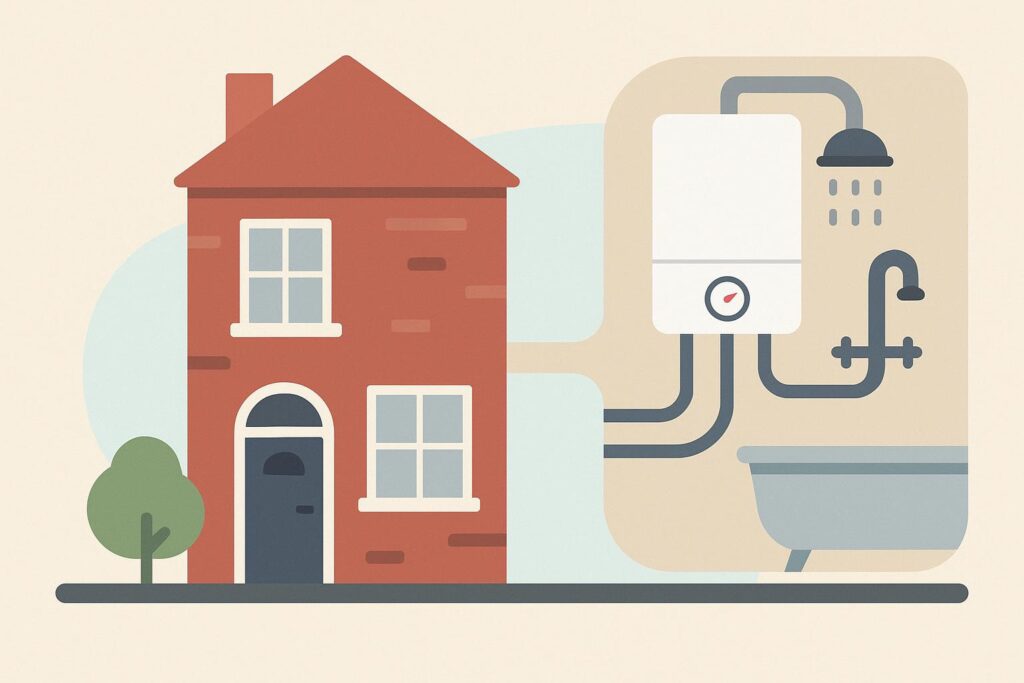
Choosing the right heating system can be a challenge for many homeowners, especially when it comes to upgrading an older unit or improving energy efficiency. If you’re exploring boiler installations in Bath, one of the most trusted options on the market is the Worcester Bosch combi boiler. Designed for modern living, these boilers deliver hot water on demand while saving space and reducing energy costs. Yet, many property owners in Bath are unsure which model suits their home, how installation works, and what benefits they can expect from making the switch. Quick Answer: Worcester Bosch combi boilers are compact, energy-efficient systems that provide instant heating and hot water, making them ideal for Bath properties that value performance, reliability, and modern convenience. Why Worcester Bosch Combi Boilers Are So Popular in Bath Worcester Bosch is one of the most respected boiler manufacturers in the UK, known for its exceptional build quality and efficiency. Combi boilers from Worcester Bosch are particularly well-suited to Bath properties, where compact living spaces, period homes, and energy efficiency requirements often make system boilers less practical. Unlike traditional systems, a combi boiler doesn’t require a separate hot water cylinder or cold-water tank, freeing up space and simplifying the installation process. Understanding the Benefits of a Combi Boiler Homeowners often choose Worcester Bosch combi boilers for several key advantages beyond just space-saving. These systems are designed to offer reliability, convenience, and lower running costs, all while maintaining a high level of performance year-round. Are Worcester Bosch Combi Boilers Right for Every Bath Property? Not every property will have the same heating demands. For smaller homes, flats, and modern builds, a Worcester Bosch combi boiler is often the perfect match. However, larger households with multiple bathrooms used simultaneously might need to consider the flow rate and potential upgrades to their mains water supply. An expert consultation can help ensure that your chosen system meets both your hot water usage and heating requirements efficiently. Installation Considerations for Bath Homes When looking into new boiler installations in Bath,it’s important to work with professional heating engineers who understand the plumbing layouts and unique property types in the area. From Georgian terraces to modern developments, Bath homes vary greatly, meaning every installation must be tailored to suit the building’s structure, water pressure, and heat output needs. A properly fitted Worcester Bosch combi boiler ensures not only long-term reliability but also optimum efficiency from day one. Choosing the Right Worcester Bosch Model Worcester Bosch offers several models, such as the Greenstar range, that cater to different household sizes and heating needs. Professional guidance helps determine the most suitable boiler capacity and specification. Factors considered during selection include the number of bathrooms, daily hot water usage, and energy efficiency goals. The right model can deliver seamless comfort while keeping operational costs down, a winning combination for Bath homeowners looking for dependable performance year after year. Ongoing Support and Maintenance After installation, regular maintenance ensures your Worcester Bosch combi boiler continues to perform efficiently. Annual servicing by qualified engineers not only prolongs the lifespan of your unit but also maintains your warranty and identifies potential issues before they escalate. Green Smart Services provides ongoing support and servicing, ensuring Bath residents enjoy consistent comfort and peace of mind throughout the colder months. Final Thoughts For homeowners seeking a smart, space-saving, and energy-efficient heating solution, Worcester Bosch combi boilers represent one of the best investments for Bath properties. Combining advanced technology, exceptional reliability, and simple operation, these boilers meet the demands of modern living while fitting perfectly into both traditional and contemporary homes across the city.Ready to upgrade your home heating system? Book your installation with Green Smart Services today and experience the benefits of Worcester Bosch combi boilers Bath. To get started, request a boiler consultation and discover the perfect heating solution for your property.
How to Avoid Last-Minute Heating Emergencies in Corsham
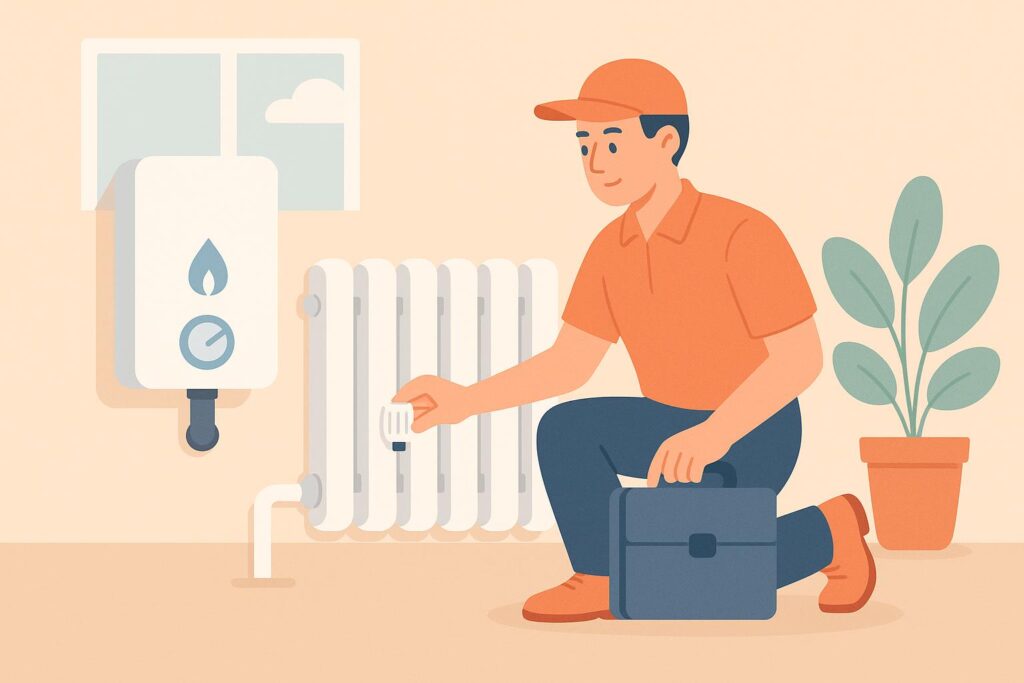
As winter sets in across Wiltshire, homeowners are reminded of the importance of keeping their heating systems in peak condition. Regular boiler servicing in Corsham is one of the most effective ways to avoid last-minute heating emergencies. A proactive approach not only ensures your system’s reliability but also helps you stay warm without unexpected breakdowns. The gas safe heating engineers at GreenSmart Services share expert advice on how you can maintain your heating system, safeguard your comfort, and prevent costly disruptions this winter. Why Heating Emergencies Happen Heating emergencies often catch homeowners off guard, especially during the coldest weeks when boilers and radiators work overtime. The most common causes include neglected maintenance, old or worn parts, sudden pressure loss, or blocked pipes. Without regular servicing, small inefficiencies can compound into serious faults, putting your home’s warmth at risk and leading to expensive callouts. How to Prevent Last-Minute Heating Emergencies in Corsham GreenSmart Services is committed to helping homeowners understand how to prevent last-minute heating emergencies in Corsham. A few preventative measures can keep your boiler in excellent shape and dramatically reduce the risk of breakdowns. 1. Book an Annual Boiler Service Regular servicing is essential to keep your boiler running efficiently and safely. During a service, a certified heating engineer inspects critical components, cleans filters, and checks for leaks or gas pressure issues. Annual boiler servicing also helps maintain your manufacturer warranty and ensures your system complies with local energy efficiency standards. 2. Check the Pressure and Bleed Radiators Low boiler pressure and trapped air in radiators are two simple issues that can cause your heating to underperform. Checking the pressure gauge regularly and bleeding radiators at the start of winter ensures even heat distribution throughout your home and reduces strain on your boiler. 3. Monitor Your Thermostat and Heating Controls Sometimes, heating issues stem from outdated or faulty thermostats. Consider upgrading to a smart thermostat to maintain energy efficiency and better control your heating schedule. Our post on smart thermostats explains how modern controls can optimize your home’s comfort and longevity of your heating system. 4. Insulate and Maintain Your Home Good insulation reduces the strain on your heating system by retaining warmth for longer. Check for drafts around windows and doors, and make sure your loft insulation meets current energy standards. Proper insulation helps your boiler work less to produce the same level of comfort, lowering both your energy bill and the likelihood of an unexpected breakdown. 5. Invest in a Heating Care Plan To truly avoid last-minute heating emergencies, consider enrolling in a Care Plans. These plans are designed to provide regular maintenance, priority service, and emergency support when you need it most. A Care Plan gives you peace of mind all year round while ensuring your boiler performs efficiently. 6. Address Minor Issues Immediately Strange noises, fluctuating temperatures, or minor leaks should never be ignored. These small signs can point to underlying issues that, if left unresolved, lead to major breakdowns. Contact your local heating experts as soon as you notice any irregularities, as early intervention can save time and money. 7. Schedule Routine Safety Checks Boilers are intricate systems that involve gas components and high pressures. Having a qualified engineer perform safety checks ensures your system operates safely and efficiently, reducing the risk of both breakdowns and hazards. 8. Learn from Common Heating Mistakes GreenSmart Services recently discussed this topic in their blog about avoiding heating emergencies. Many homeowners wait until their boiler fails to call for help. By scheduling maintenance in autumn, before peak heating season, you’ll ensure your system is ready when you need it most. The Benefits of Being Proactive A proactive approach offers three invaluable benefits: reliability, savings, and peace of mind. Reliable heating prevents discomfort during cold spells, scheduled servicing reduces costly emergency callouts, and well-maintained systems last longer. Moreover, efficient boilers consume less energy, which contributes to lower utility bills and a smaller carbon footprint, something every Corsham homeowner can appreciate. Stay Warm, Safe, and Prepared Now that you know how to prevent last-minute heating emergencies in Corsham, take steps today to protect your home. Whether you need annual boiler servicing, want to join a maintenance plan, or require expert repairs, the team at GreenSmart Services is here to help you stay comfortable all year round. Don’t wait for a breakdown to happen, schedule your service or discuss your options today. To learn more or to book an appointment, contact us and let our trusted local engineers make sure your heating is reliable when you need it most.